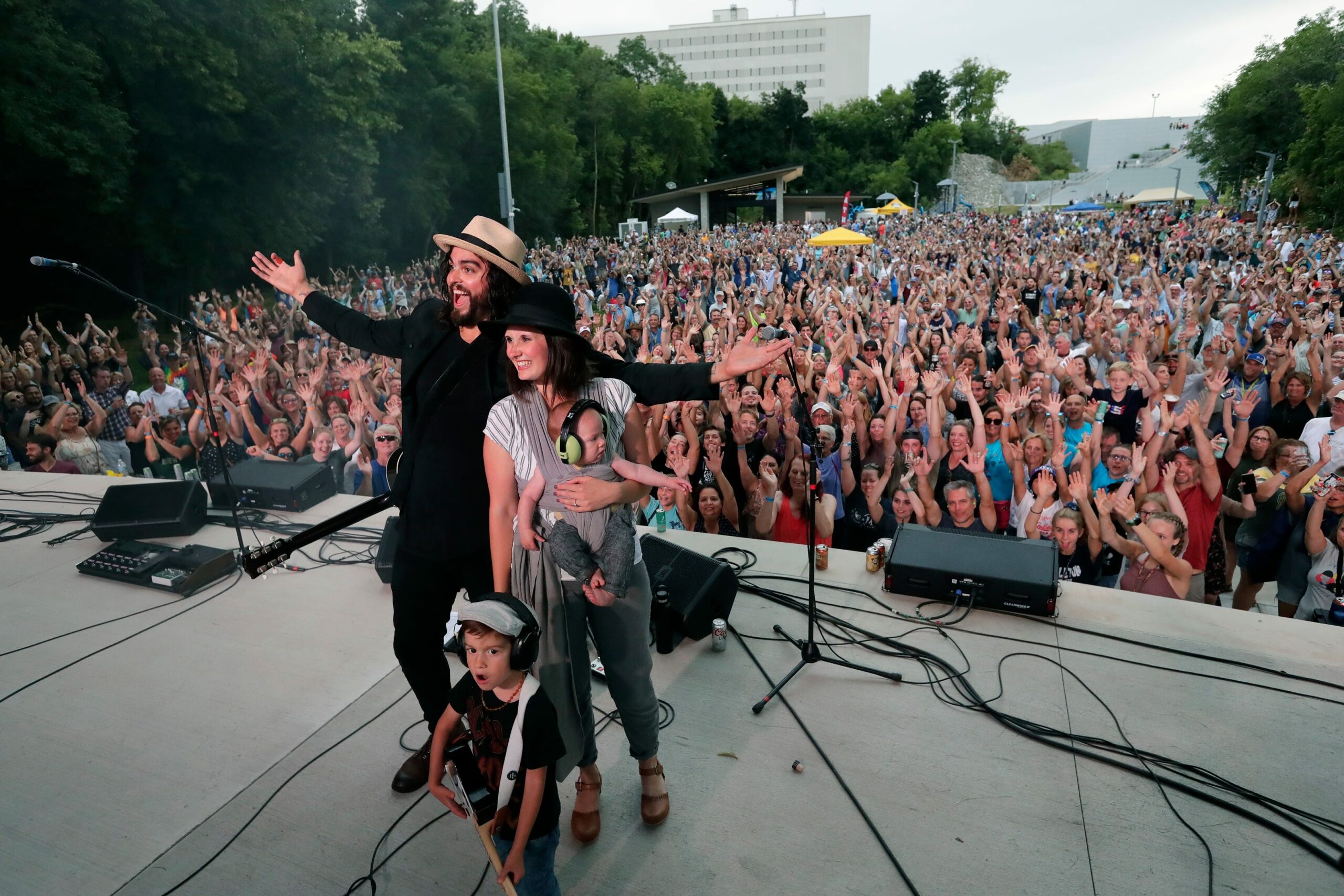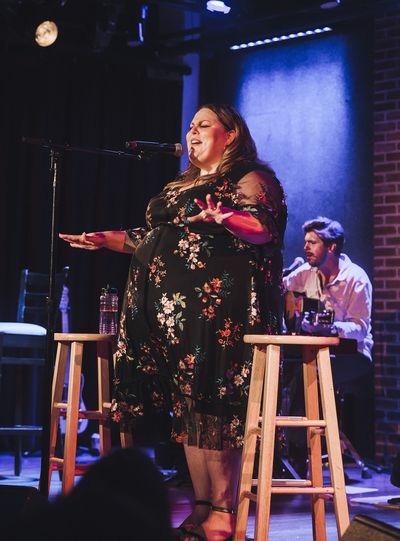Cologne’s inaugural Shalom Music festival unites classical, jazz, club, folk and even medieval music under the banner of Jewish music. But is there actually anything that unites this radically diverse program?
Over a pulsating beat, Ramona Kozma (pictured top center) melancholicly sings about a worthless life given meaning by a pair of dark eyes. The rhythm is pure tango. But the language is Yiddish.
Kozma is the accordion player and singer of Trio Picon, a German ensemble performing Yiddish tango, and the trio is one of many musical groups performing at the first Shalom Music Cologne festival (Shalom-Musik.Köln). The week-long event, an offshoot of the city’s 2021 celebration of 1,700 years of Jewish life in Germany, is dedicated to presenting Jewish music.
Yiddish tango was a popular genre in the 1920s-30s, with composers from Latin America as well as the United States and Eastern Europe writing words in the language of Ashkenazi Jews to the emotionally intense Argentine music. Yet it’s not a style of music people usually think of when they hear the words “Jewish music.”
“I have noticed that there is a relatively large knowledge gap,” says Kozma. “For example, Balkan music or Romanian music … is often associated with Jewish music. But that’s just not true.”
Yiddish tango is one of many genres included in the festival program. The others range from classical art song to modern jazz to club music to synagogue organ works. The musical diversity reflects the diversity of the Jewish experience, both throughout history and today, while at the same time raising the question: What exactly falls under the umbrella term “Jewish music”?
The Shalom Music festival is organized by the Cologne Forum for Culture in Dialogue and the Cologne Synagogue Community
Jewish music? Depends how you define it
Jean Goldenbaum, researcher and professor at the European Center for Jewish Music in Hanover, is very familiar with this question – it’s usually the first he gets on the subject. This may interest you : Beyoncé and Drake make this the summer of house music – and we’re here for it.
“The first thing I explain is that there is no definitive answer. And there is no concrete answer,” says Goldenbaum.
There is not one overall factor that unites Jewish music, he explains. Instead, it relates to which parameters are set, and then which elements are present. Or, as Goldenbaum puts it, “does it bring something or things that show us or locate us in this [Jewish] cultural universe?”
A very restrictive interpretation could define Jewish music as liturgical music in Hebrew intended for the synagogue, while a broader definition could include non-religious music with lyrics in Hebrew or other Jewish languages; non-Jewish language texts that nevertheless draw on Jewish texts or themes; or the use of musical motifs and stylistic features commonly found in the Jewish musical tradition, such as certain musical keys or melodic patterns and embellishments.
In the case of Yiddish tango, the elements go beyond language.
“Yiddish tango is definitely written in – I would call it – tonality typical of synagogue music, which klezmer music also shares … the vocal part is also influenced by synagogue singing and a particular way of making certain sound effects or raw crying sounds with the voice,” says Kozma.
Compositions by non-Jewish composers that used Jewish elements may also fall under the category of Jewish music. The opening night of the Shalom Music festival featured a familiar example: “Kol Nidrei,” by Max Bruch. The Protestant composer wrote the piece based on Jewish melodies in the early 1880s for Liverpool’s Jewish community. The name comes from the declaration recited during Yom Kippur services.
The tricky issue of identity
The reverse scenario—a composition by a composer of Jewish origin that contains no visible elements that orient it within Jewish musical tradition—is perhaps the most contentious when it comes to definitions of Jewish music. To see also : Hype Train Signs Expanded Deal With Universal Musical Group.
“Another very, very big question is if the piece has no Jewish musical elements, nor does it have Jewish lyrics, but the composer is Jewish. What do we do about that?” Goldenbaum speaks out.
Categorization in this case is difficult because it boils down to identity, a subject that is never clear-cut.
“This question and this answer will ultimately be greater than the composer’s conceptions,” says Goldenbaum. There will be disagreement, he adds, which is fine: “Because it’s about perspectives. It’s about concepts. How do you choose to understand music. And it’s about identity.”
Israeli jazz trumpeter Avishai Cohen, a festival headliner, presented his new album, ‘Naked Truth’
A prominent example of the difficulty associated with identity is the music of the Austrian composer Gustav Mahler. Born a Jew, he converted to Catholicism to secure a prestigious post at the Habsburg court, and his compositions do not draw overtly Jewish elements. The opening concert of the Shalom Music Festival featured classical songs, with Mahler using traditional German folk poetry.
The festival’s artistic director Thomas Höft emphasizes that there is more than one lens through which Mahler’s music can be examined.
“This repertoire has many more characteristics,” he says. “But is there anything specifically Jewish about Gustav Mahler? Is there? Is it being denied? Has he himself repressed this? What is there? Can we assess it? Or is it a false assumption? This is an experimental categorization. We puts on glasses that have been influenced by different experiences and uses them to look at a very wide repertoire.”
“Electric Counterpoint,” by contemporary American composer Steve Reich, is another example of an ambiguous composition. While other works draw on his Jewish heritage, this looping piece for electric guitar and recorded samples, performed by Cologne-based Israeli guitarist Tal Botvinik at the festival, uses central African horn themes.
In addition to Steve Reich’s ‘Electric Counterpoint’, Tal Botvinik also performed Hebrew and Latin songs on acoustic guitar
‘It’s all about the question’
Then there’s the self-described “sexually charged freak-fest” that is The White Screen. To see also : iTunes changed the music industry forever in 6 ways.
There is nothing particularly “Jewish” about the duo’s music, says Höft, which mixes art-rock, gospel-punk and psych-pop. But as is the case with any identity, the outsider perspective plays a role.
“They come from Israel and they are ‘read’ by people who don’t want them to perform. And then they perform and we look at them through these glasses and ask ourselves, ‘Is this Jewish, Israeli or even totally colorful worlds of music? Right now, is this queer music from a dance floor context?’ It all comes down to the question.”
By taking a broad, inclusive approach, the Shalom Music Festival has created a line-up that spans the Middle Ages to the present day, offering countless musical styles and making audiences reflect on their own idea of what Jewish music can be.
So what finally unites the festival’s musical panorama? For Höft, it’s quite simple: “Only the title. Only the perspective.”





